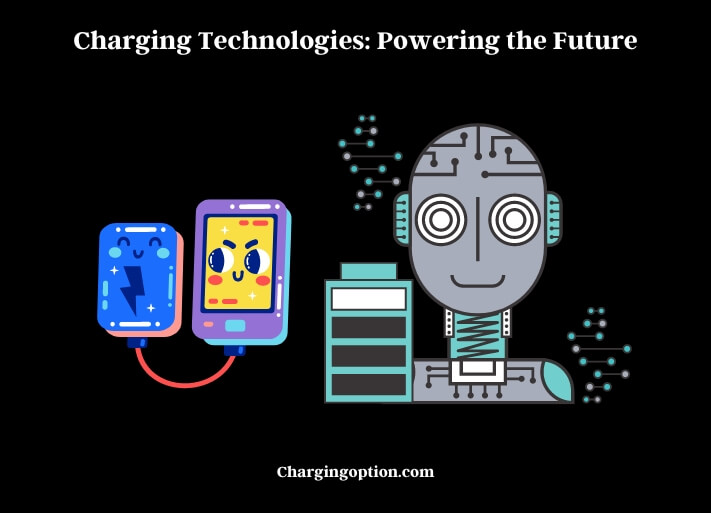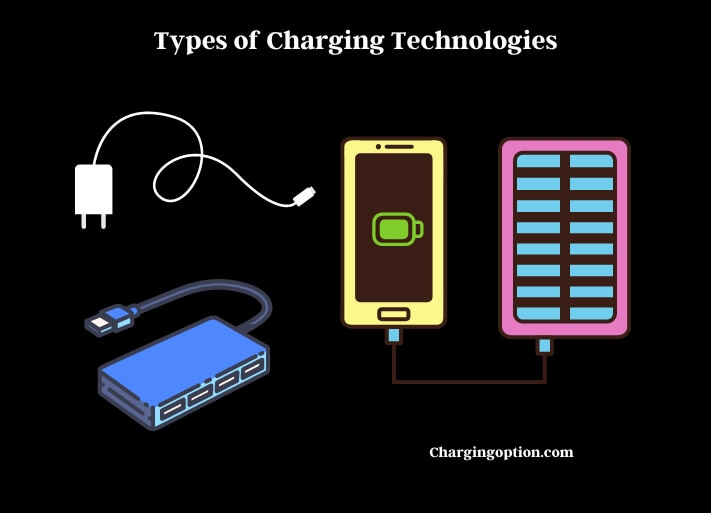The importance of charging technologies cannot be overstated in today’s world where we rely heavily on electronic devices and appliances. The ability to charge these devices quickly and efficiently is crucial to keep up with our fast-paced lifestyle. From smartphones and laptops to electric cars and renewable energy systems, charging technologies play a vital role in powering our daily lives.

The history of charging technologies can be traced back to the invention of the battery in the 19th century, which paved the way for the development of charging methods for portable devices.
With the advent of wireless charging and fast-charging technologies, charging has become more convenient and time-efficient. The rapid growth of technology has also brought forth new challenges, such as compatibility issues and sustainability concerns.
Today, charging technologies are constantly evolving to meet the increasing demand for energy-efficient and sustainable solutions. The world is moving towards renewable energy sources, and charging technologies are no exception. The rise of electric vehicles and the need for charging infrastructure have further accelerated the development of charging technologies.
Types of Charging Technologies
There are various types of charging technologies available today that cater to different devices and applications.

Wired Charging
Wired charging is the traditional method of charging, where the device is connected to a power source using a cable. This method is still widely used today, and it is reliable and efficient. It can be inconvenient to carry cables around and plug and unplug devices every time they need to be charged.
Wireless Charging
Wireless charging is a more convenient and cable-free alternative to wired charging. It uses magnetic induction or resonance to transfer energy wirelessly from a charging pad to a device. This technology is commonly used for smartphones and wearables, and it eliminates the need for cables and plugs.
Fast Charging
Fast charging is a technology that enables devices to charge faster than traditional charging methods. It uses higher voltage or current to charge the battery more quickly. Fast charging technology is widely used in smartphones and other portable devices, and it can significantly reduce charging times.
Supercharging
Supercharging is a more powerful version of fast charging, typically used for electric vehicles. It uses a higher voltage and current to charge the battery more quickly, allowing for shorter charging times and longer driving ranges.
Solar Charging
Solar charging is a sustainable and renewable method of charging that uses solar panels to convert sunlight into electricity. This technology is commonly used for outdoor and portable devices, and it is an eco-friendly alternative to traditional charging methods.
Innovations and Advancements
Charging technologies have come a long way since their inception, and there have been several innovations and advancements that have improved their efficiency, convenience, and sustainability. Here are some of the most notable innovations and advancements in charging technologies:
Gallium Nitride (GaN) Chargers
Gallium Nitride (GaN) chargers are a new type of charger that uses a semiconductor material called gallium nitride to increase charging efficiency. GaN chargers are smaller, more efficient, and generate less heat than traditional chargers, making them an excellent choice for fast charging.
USB-C Power Delivery (PD)
USB-C Power Delivery (PD) is a fast charging technology that uses a USB-C cable and charger to deliver power at a higher voltage and current. This technology is capable of charging devices faster than traditional charging methods and is commonly used in smartphones, laptops, and other portable devices.
Magnetic Resonance Wireless Charging
Magnetic resonance wireless charging is a new type of wireless charging technology that allows devices to be charged over a distance. This technology uses magnetic resonance to transfer energy wirelessly between a charging pad and a device, allowing for greater flexibility and convenience.
Intelligent Charging Systems
Intelligent charging systems use advanced algorithms and sensors to optimize charging efficiency and prevent overcharging or overheating of devices. These systems are commonly used in electric vehicles and renewable energy systems, and they help improve battery life and overall energy efficiency.
Innovation and advancements in charging technologies are essential for keeping up with the increasing demand for fast, efficient, and sustainable charging solutions. These advancements have made charging more convenient, faster, and more eco-friendly than ever before, and we can expect to see even more innovative charging technologies in the future.
Sustainability and Charging Technologies
Sustainability is an essential factor in the development and use of charging technologies. As the world moves towards renewable energy sources, it is crucial that charging technologies also become more sustainable and eco-friendly.
Renewable Energy Sources
The use of renewable energy sources such as solar, wind, and hydro power for charging devices and electric vehicles is becoming increasingly common. Renewable energy sources are clean, sustainable, and reduce dependence on fossil fuels, making them an excellent choice for charging technologies.
Energy Storage
Energy storage technologies such as batteries and supercapacitors are essential for sustainable charging. These technologies can store energy generated from renewable sources and provide power during periods of low energy production or high demand. Energy storage technologies are becoming increasingly efficient, and they are critical for the widespread adoption of renewable energy and electric vehicles.
Energy Efficiency
Efficient charging technologies can reduce energy consumption and improve sustainability. For example, GaN chargers and USB-C PD chargers are more efficient than traditional chargers, reducing energy waste and saving money on electricity bills.
Recycling and Disposal
The responsible disposal and recycling of batteries and other charging components is critical for sustainability. Many companies are now developing programs and partnerships for the responsible disposal and recycling of charging components to reduce waste and environmental impact.
Challenges and Future Outlook
While charging technologies have come a long way in terms of efficiency, convenience, and sustainability, there are still several challenges that need to be addressed.
Infrastructure
One of the most significant challenges facing charging technologies is the lack of infrastructure. While electric vehicle charging stations and public charging stations are becoming more common, there is still a long way to go before charging infrastructure is as widespread as petrol stations. The future outlook for charging infrastructure is positive, with governments and companies investing heavily in the development of charging stations and networks.
Compatibility
Compatibility between charging technologies and devices is another challenge. With so many different types of chargers and devices, it can be challenging to ensure that they are all compatible. The future outlook for compatibility is positive, with companies working on developing standardized charging technologies that can be used across a range of devices.
Battery Technology
Battery technology is a crucial factor in the future of charging technologies. While battery technology has come a long way, there is still room for improvement in terms of energy density, charging time, and cost. The future outlook for battery technology is positive, with companies investing heavily in the development of new battery technologies that are more efficient, affordable, and sustainable.
Sustainability
Sustainability is another significant challenge facing charging technologies. While charging technologies are becoming more sustainable, there is still room for improvement in terms of reducing energy consumption and environmental impact. The future outlook for sustainability is positive, with companies and governments investing heavily in renewable energy sources and energy storage technologies.
How Do Wireless Chargers Fit into the Future of Charging Technologies?
Wireless charging technology is set to revolutionize the way we power our devices. With the convenience of being able to charge without the hassle of cables, this technology is seamlessly fitting into our everyday lives. As more and more devices become compatible, wireless chargers are the future of charging technologies.
What Are the Latest Innovations in Charging Technologies for the Future?
The future of charging is bright with the latest innovations in renewable energy sources like solar and wind power. Other advancements include wireless charging, fast-charging technology, and improved battery storage. These developments promise to make charging more efficient, convenient, and sustainable for the future.
In a Nutshell
Charging technologies have revolutionized the way we power our devices and vehicles, providing us with more convenience, efficiency, and sustainability. From traditional wired chargers to wireless charging pads and even solar-powered charging stations, charging technologies have come a long way in terms of innovation and advancements.
As we move towards a more sustainable future, charging technologies will continue to play a vital role in reducing our dependence on fossil fuels and minimizing our impact on the environment. With the continued development of renewable energy sources, energy storage technologies, and more efficient charging solutions, the future of charging technologies is bright.
There are still several challenges that need to be addressed, including the lack of infrastructure, compatibility issues, battery technology, and sustainability. As these challenges are addressed, charging technologies will become even more efficient, convenient, and sustainable.
